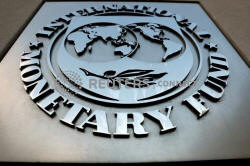IMF sees 4.5% growth in Central Asia, Caucasus in
2019-20 despite weaker trade
 Send a link to a friend
Send a link to a friend
 [November 08, 2019] By
Margarita Antidze [November 08, 2019] By
Margarita Antidze
TBILISI (Reuters) - Economies in the
Caucasus and Central Asia (CCA) will expand by an overall 4.5% in both
2019 and 2020 despite global trade tensions and slowing growth in key
trading partners, the International Monetary Fund said on Friday.
The IMF called on the former Soviet republics to improve
competitiveness, use their natural advantages more effectively and
diversify their economies to reap the gains from trade and integration
into global value chains.
The Fund's report covers the Caucasus nations of Armenia, Azerbaijan and
Georgia, and the Central Asian states of Kazakhstan, Kyrgyzstan,
Tajikistan, Turkmenistan and Uzbekistan.
"Despite weaker trade, overall growth for the CCA region is expected to
remain about 4.5% in 2019–20, largely owing to a looser fiscal stance
and private sector credit growth," it said.

Juha Kahkonen, deputy director of the IMF's Middle East and Central Asia
Department, told Reuters the big challenge for CCA states was to create
jobs and adopt reforms to spur activity.
"Current growth rates are not bad from a global prospective, but
countries should not be satisfied with this," he said.
External risks include trade tensions, a global slowdown, lower
commodity prices and rising geopolitical risks, the Fund said, while
domestic risks include slowing reform momentum.
Azerbaijan, Kazakhstan and Turkmenistan are energy exporters while
Armenia, Georgia, Kyrgyzstan, Tajikistan and Uzbekistan import all or
most of their oil and gas.
[to top of second column] |

The International Monetary Fund (IMF) logo is seen outside the
headquarters building in Washington, U.S.,September 4, 2018.
REUTERS/Yuri Gripas

COMMON AND DIFFERENT CHALLENGES
"There is a need to diversify, make the economy more reliant on private
sector activity and also the banking sector has not been reformed,"
Kahkonen said of Azerbaijan.
He said private sector credit had stabilized after years of decline, but
that "banks are not really in good shape to support private sector
activity".
In Kazakhstan, too, there "needs to be a supply of bankable projects,
the government needs to have policies to diversify the economy and make
sure that the private sector is an engine of growth," Kahkonen added.
Kazakh banks meanwhile "need to have a new business model".
The IMF official praised reforms in Armenia, which has the fastest
growth in the region, and Georgia's favorable business climate.
He said the Fund's program in Tajikistan, the poorest CCA country, was
on hold as the government was not ready to commit to policies needed
support it, including banking sector reform, moving to a flexible
exchange rate and fiscal prudence.
Recent Uzbek economic reforms were a positive development, Kahkonen
said, adding: "Once it's clear that the reforms are cemented and are
there to stay, there would be a tremendous interest ... but there is a
long way to go."
(Writing by Margarita Antidze; editing by Gareth Jones and Catherine
Evans)
[© 2019 Thomson Reuters. All rights
reserved.] Copyright 2019 Reuters. All rights reserved. This material may not be published,
broadcast, rewritten or redistributed.
Thompson Reuters is solely responsible for this content.
 |